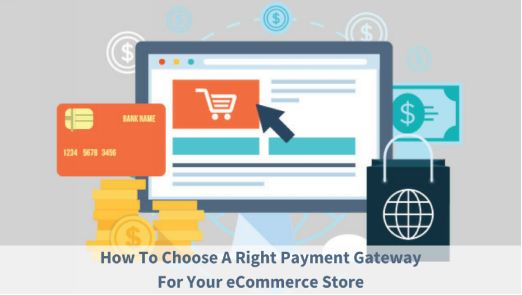A Quick Payment Gateway Selection Guide For Your Online Business
Payment gateway plays a significant role in the success of an eCommerce transaction. Research shows that 50% of consumers are likely to abandon the transaction if their preferred payment gateway is not available during checkout.

Although a majority of online merchants offer multiple payment gateway options to their customers, it doesn't ensure a successful transaction or conversion. There are dozens of payment gateways available in the market. Which is why finding the right payment gateway for your business and consumers is difficult. We have covered a few factors that you must take into consideration while choosing a payment gateway for your eCommerce store.
4 Factors You Must Take Into Account While Choosing The Right Payment Gateway:
- Does the Payment Gateway Integrate with your eCommerce platform?
- A majority of payment gateway providers offer easy or one-click integration. But before deciding on one, you must ensure that the payment gateway supports your current version of the eCommerce platform. Some payment gateways do not have existing plugins or extensions for your platform. This involves a lot of custom development work including an enormous amount of time and resources. The best thing you can do is to have an experienced eCommerce development company to develop your store using an open-source platform that offers wide-ranging extensions or plugins. This extensions/plugins can integrate your store with popular payment gateways quickly and easily.
- Does the Payment Gateway offer methods your target customers use?
- From the massively popular Mastercard and Visa to other niche payment methods like Bitcoin, there are several online payment methods that are in use around the world. But each payment gateway does not support all the payment methods out there. Therefore, you need to identify the payment methods your target customers are using and choose the payment gateway that supports those methods. For instance, if you select Stripe as the payment gateway and your target customers transact a lot using PayPal, then it's a bad choice as Stripe doesn't accept PayPal payments.
- Does the Payment Gateway promise to grow with your business?
- A growing business requires a payment gateway to be able to keep up with it. If the user engagement of your business increases, the payment gateway must offer or launch products that enable customers to make faster payments. Stripe which is a popular payment gateway recently launched a feature for Twitter users that allows them to complete their purchase directly from a tweet without having to leave the website. By using such innovative features and platforms, you can reach out to more customers while ensuring the growth and success of your business.
- Does the Payment Gateway promise to improve your checkout UX (user experience)?
- A payment gateway if correctly chosen can improve your checkout process by reducing the number of steps involved and speeding up the process. If you choose to integrate the globally acclaimed service PayPal Express, you can auto-populate the information of your customers through its API and turn it into a one-click checkout. However, since checkout is the overall transaction success determinant, you must ensure that it is both seamless and easy. Customers usually return to stores that offer a fast and painless checkout process which ultimately results in enhancing your customer retention ratio.
Takeaway:
Customers love options and control in everything they do. Offering just one payment gateway may prevent you from increasing your conversions and revenue. So, keep the above-mentioned points in mind while choosing the payments gateways for your business and lower down the cart abandonment rates.
Does your eCommerce store offer multiple payment methods to customers? Which payment gateways is your store integrated with? Drop your comments below.

